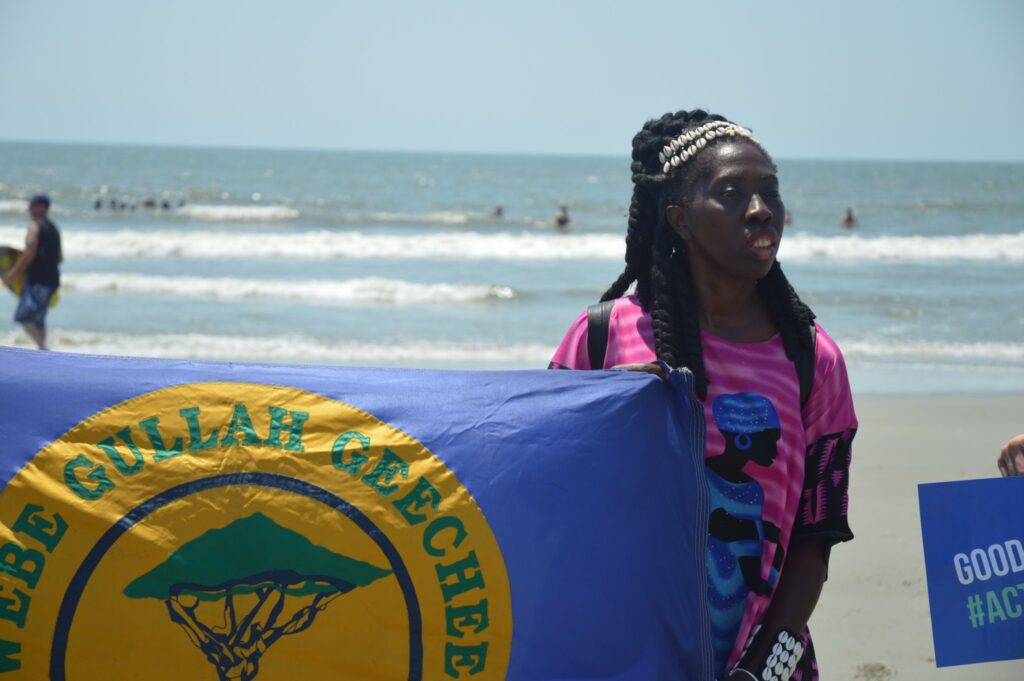
Mothers & Others For Clean Air deeply believes that access to clean air is an inherent human right. We acknowledge that communities of color often suffer from an unequal burden of toxic pollution. We offer the following resource to advance education and dialogue about Environmental Racism within the state of South Carolina. This is not a comprehensive list of issues, leaders, or organizations within South Carolina. Rather, this post highlights a few issues and resources, and thus encourages continued awareness and involvement with issues of environmental racism in South Carolina. We welcome anyone to share additional resources or thoughts with us.
What does Environmental Racism Look Like in South Carolina?
Gullah/Geechee Nation: The Gullah/Geechee people are African descendants who were historically enslaved on the rice plantations of the southern “sea islands.” Their enslavement on Lowcountry plantations led to a deep cultural identity trademarked by their unique Creole language, sweetgrass basket making, textiles, music, foodways, and spirituality. Despite the Nation’s indigenous knowledge which has proven resilient against flooding and hurricanes, The Gullah/Geechee Nation does not have sufficient representation concerning community legislation and health and safety efforts. The Gullah/Geechee Sea Island Coalition along with the Gullah/Geechee Sustainability Think Tank have worked together to offer cultural competency training about indigenous sustainability knowledge. To learn more about the Gullah/Geechee Nation click here.
Rosemont Neighborhood, Northern Charleston Peninsula: Rosemont neighborhood is a Historically Black/Gullah/Geechee neighborhood in the Northern Charleston peninsula. The neighborhood borders former phosphate chemical plants. In 1994, an explosion at the Albright and Wilson plant released toxic chemicals into the air which leaked into the soil and groundwater. To this day, residents have continued to report that the air and the water smell bad. The area has consistently suffered from toxic levels of lead, arsenic and mercury[i].
This same neighborhood was sliced through in the 1960s by the building of I-26. This interstate split the neighborhood in two and separated many community members who were without cars from the grocery stores that were on the other side of the highway. The building of this highway also increased the traffic flow through the neighborhood which likely increased the air pollution[ii].
North Charleston Port Expansion: A terminal at the fifth Port of Charleston is being planned for expansion. The goal of this expansion is to allow large container ships from the Panama Canal to enter into the port. The cargo on these ships will then be unloaded onto diesel trucks. Currently, 10,000 diesel trucks per day travel to the port through the surrounding North Charleston communities. These seven neighborhoods are already economically distressed and are comprised of mostly Black and people of color residents, many of whom are native Gullah/Geechee. The proposed port expansion will increase the diesel truck traffic flow through these neighborhoods by 70%, or up to 17,000 trucks per day[iii]. This increase in traffic will cause the air pollution in the area to rise, and could result in respiratory and behavioral health complications for the residents.
What is South Carolina’s Government Doing About Environmental Racism?
The South Carolina Department of Health and Environmental Control has an Environmental Justice Advisory Committee. The committee encourages collaborative partnerships between individuals, organizations, and the government.
BIPOC Scientists, Academics, Lawyers, and Researchers Working on Environmental or Health Racism
There are many scientists, academics and researchers working to change the course of environmental and health racism in the state of South Carolina. The professional highlighted below is a BIPOC researcher. We offer her name as a gateway for individual or organizational research. We recognize that there are many incredible researchers whose names are not on this list. We welcome anyone to share additional names with us.
Dr. Sarah Commodore: Research Associate Medical University of South Carolina; Health disparities and air quality
To Get Involved with Environmental Racism Advocacy in South Carolina Follow & Consider Donating to the Following BIPOC Led Organizations:
“The Gullah/Geechee Sea Island Coalition and the Gullah/Geechee Sustainability Think Tank has remained focused on accomplishing the United Nations Sustainability Development Goals (UN SDGs) and continues to work with global partners to raise awareness via climate science in order to reverse the negative impacts of climate change on the Sea Islands of the Gullah/Geechee Nation. The rising seas and rising temperatures that are being witnessed have consistently been documented while the world’s scientists seek the answers to what human behaviors can be altered in order to bring these things back into alignment and cause the environment to be balanced and the earth to be healed.”
To make donations:
Email: GullGeeCo@aol.com
CashApp: $GullahGeecheeNation
Low Country Alliance for Model Communities
“LAMC is the Lowcountry Alliance for Model Communities – a nonprofit organization founded for the purpose of advocating environmental justice and promoting community development, education, employment, quality housing, and community involvement for the study area neighborhoods.
The VISION of LAMC is to achieve sustainable and vibrant communities that encompass all the amenities of a healthy and thriving area.”
[i] Waters, D. (n.d.). Is pollution poisoning Charleston’s African-American and low-income communities? | Features | Charleston | Charleston City Paper. Charleston City Paper. Retrieved August 7, 2020, from https://www.charlestoncitypaper.com/charleston/is-pollution-poisoning-charlestons-african-american-and-low-income-communities/Content?oid=5790876
[ii] Emerson, Anne. n.d. Charleston’s Historic Rosemont Community Impacted by Environmental Issues | WCIV. Accessed August 7, 2020. https://abcnews4.com/news/local/charlestons-historic-rosemont-historically-afflicted-with-environmental-issues.
[iii] Svendsen, E. R., Reynolds, S., Ogunsakin, O. A., Williams, E. M., Fraser-Rahim, H., Zhang, H., & Wilson, S. M. (2014). Assessment of Particulate Matter Levels in Vulnerable Communities in North Charleston, South Carolina prior to Port Expansion. Environmental Health Insights, 8, EHI.S12814. https://doi.org/10.4137/EHI.S12814




